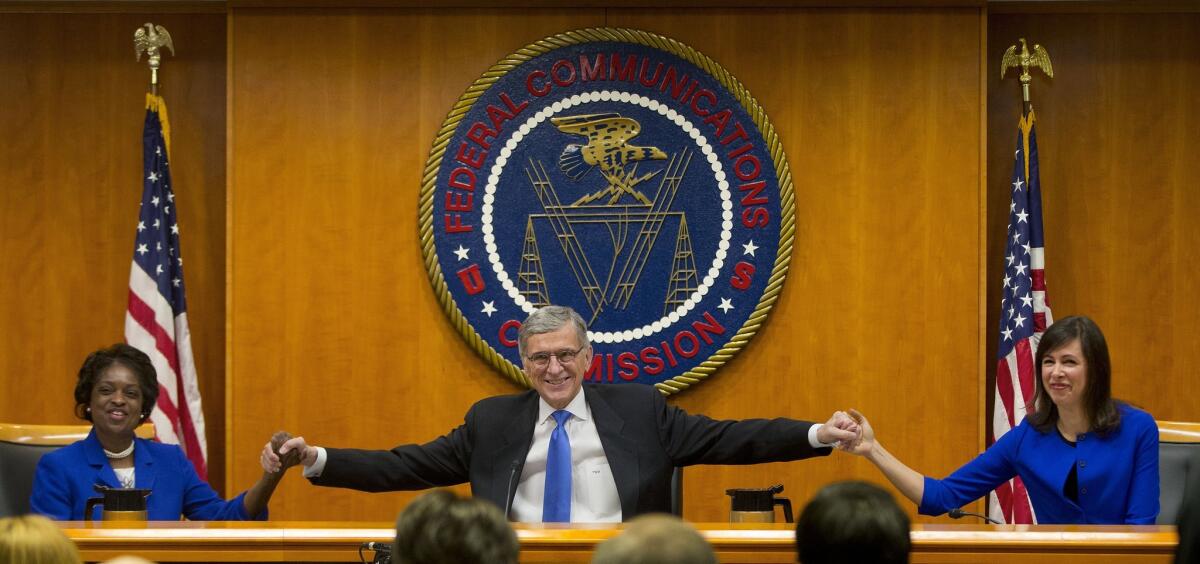Opinion: The FCC has acted on net neutrality. Now it’s Congress’ turn

For a decade, Congress twiddled its collective thumbs while the Federal Communications Commission took an increasingly rigorous approach to protecting net neutrality.
Now, perhaps, lawmakers will actually do something to preserve the free and open nature of the Internet.
On Thursday, the FCC slapped its toughest rules yet on broadband Internet service providers, reclassifying them as telecommunications utilities and barring them from interfering with the data flowing to and from their customers. The one-two punch of reclassification and prohibition came a little more than a year after a federal appeals court threw out the commission’s previous rules, which sought to place a similar ban on ISPs without reclassifying them as utilities.
There’s broad agreement that the status quo online, in which ISPs don’t prioritize data packets based on their source, should be preserved. The fight is over how to do that.
The most elegant way would be to have Congress amend federal communications law to give the FCC narrowly tailored authority to write rules against ISPs interfering with the data on their pipelines, with an exception for reasonable network management. But when lawmakers tried to do so in previous sessions of Congress, their efforts were blocked by colleagues who refused to “regulate the Internet.”
That left the FCC scrambling to find a way to apply existing provisions of the communications act, many of which date back to 1934 and the local Bell phone monopolies, to broadband ISPs. The commission’s efforts ran afoul of the federal courts, which twice rapped the agency for exceeding its statutory authority when it enacted or enforced neutrality rules.
As the Los Angeles Times’ editorial board wrote Thursday, the last court ruling gave the FCC two choices: “Either adopt flexible rules and respond to complaints against ISPs as they arise, or reclassify ISPs as utilities and flatly prohibit them from playing favorites.” Wheeler and his two fellow Democrats on the commission voted to reclassify because they (and scores of neutrality advocates, venture capitalists and Internet start-ups, as well as President Obama and millions of Internet users) felt it offered the most legally defensible way to enact iron-clad protections for a free and open Internet.
We never would have reached this point had foes of regulation not stopped Congress from giving the FCC specific authority just to protect net neutrality. Nor would the FCC have reclassified ISPs had one of the loudest opponents of reclassification, Verizon, not sued to challenge the commission’s previous set of rules.
Thursday’s action should breathe new life into the effort to write a new chapter of communications law specifically for ISPs. They’re clearly the 21st century version of a dial-tone provider; the Internet is the dominant communications medium of the day, and you can’t get on it without an ISP’s help. But many of the regulations designed for monopoly local phone companies don’t or shouldn’t apply to what ISPs do.
Former Rep. Rick Boucher, a centrist Virginia Democrat who opposes reclassification, said the FCC’s move opens the door for Congress to enact a less regulatory approach to net neutrality. “After more than a decade of wrangling about the proper regulatory classification of broadband services and the scope of the FCC’s authority, it is time for Congress to provide the certainty that consumers and industry need,” Boucher said in a statement, adding that the goal should be “to ensure that the promise of broadband remains available for entrepreneurs, innovators and America’s consumers without a return to the days of utility regulation.”
Of course, the ideological divide between Democrats and Republicans on the subject of government regulation won’t make matters any easier.
The chairmen of the House and Senate committees that oversee the Internet have floated a draft bill that claims to protect net neutrality, but it would leave the FCC powerless to protect consumers against new threats. The measure seems more focused on reining in the FCC than preventing ISPs from picking winners and losers online. That means it won’t pass muster with tech-friendly Democrats and the White House, at least not in its current form.
An even bigger hurdle to congressional action has been the conviction among conservatives and libertarians that there is no problem that Congress or the FCC needs to solve.
Both sides in the debate seem to agree that it would be a bad thing for ISPs to favor some websites and services over others, tipping the competitive scales in favor of their affiliates or deep-pocketed partners. ISPs haven’t done that yet, and the biggest ones have said they don’t plan to do so.
Yet ISPs also have started poking holes here and there in the neutral fabric of the Internet. For example, AT&T lets websites pay to have their traffic excluded from mobile phone customers’ monthly data caps. And Comcast, which has imposed data caps on a trial basis in some cities, excludes its own video app from the caps but not competing video apps.
Beyond that, Verizon told the appeals court hearing its lawsuit against the FCC’s last neutrality rules that it wanted to explore a “two-sided” market, meaning that it could seek payments not just from its subscribers, but also from the sites, applications and services that wanted to reach them. And opponents of neutrality rules often argue that if ISPs can’t extract revenue from websites, they won’t be able to meet the demand for bandwidth being driven by the burgeoning popularity of online video services.
That’s the sort of talk that’s led the FCC to keep trying to enact net neutrality rules. And now that the commission has gone where Republicans really didn’t want it to go, Congress should stop jawboning and provide the FCC with the right amount of authority to preserve the neutral status quo.
Follow Jon Healey’s intermittent Twitter feed: @jcahealey
More to Read
A cure for the common opinion
Get thought-provoking perspectives with our weekly newsletter.
You may occasionally receive promotional content from the Los Angeles Times.











